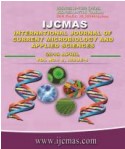


 National Academy of Agricultural Sciences (NAAS)
National Academy of Agricultural Sciences (NAAS)

|
PRINT ISSN : 2319-7692
Online ISSN : 2319-7706 Issues : 12 per year Publisher : Excellent Publishers Email : editorijcmas@gmail.com / submit@ijcmas.com Editor-in-chief: Dr.M.Prakash Index Copernicus ICV 2018: 95.39 NAAS RATING 2020: 5.38 |
An experiment was designed to assess the response of Sulphur to different Chickpea cultivars at Agriculture farm of Mahatma Gandhi Chitrakoot Gramodaya Vishwavidyalaya, Chitrakoot, Satna (M.P.). Three varieties (DCP 92-03, JG-16, JG-11) Seed Treatment in Chickpea with Rhizobium and three Sulphur levels (10, 20, 30 and 40 kg S /ha) along with all possible interactions were used. Experimental design fallowing split plot design in three replications was employed data was collected on yield parameters. Rhizobium species form an endosymbiotic nitrogen-fixing association with roots of legumes and Parasponia. The bacteria colonize plant cells within root nodules, where they convert atmospheric nitrogen into ammonia using the enzyme nitrogenase and then provide organic nitrogenous compounds such as glutamine or ureides to the plant. Sulfur is an essential nutrient for plants because it is a constituent of the amino acids cysteine (Cys) and methionine (Met), metal cofactors, coenzymes, and secondary metabolites. The application of 40 kg S / ha-1 enhanced the plant height, number of branches, No. of nodule, nodule dry weight, no. of pods / plant, no. of seeds / plant, seed weight / plant, 100 seed weight (g) / plot, significantly over S1, S2, S3. This reflects the fact that sulphur only up to 30 kg / ha-1 (40 Kg S / ha-1) was sufficient to meet the requirement of the actively growing plants under the existing sulphur status of the soil.
 |
 |
 |
 |
 |